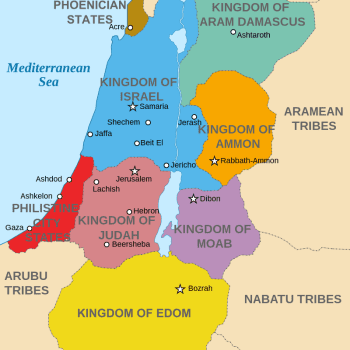I wrote back in 2006 that I found an article published in the New York Times, “For Evangelicals, Supporting Israel Is ‘God’s Foreign Policy’,” deeply disturbing. The same views continue to be widely held and so it seems worth revisiting this topic. It is not that I think supporting Israel is in itself a bad thing – far from it. But the combination of a number of specific features of American right-wing fundamentalist Christians’ support of Israel I find problematic as a Christian when viewed specifically in light of the Bible.
First, these American supporters are pro-Israel unconditionally, even though in the Biblical tradition Israel is depicted as being denounced and at times even punished and exiled by God, in spite of Israel’s consistent confidence that as the chosen people God is on their side. This unconditional support is perhaps illustrated by the fact that Israeli news is the only national news program that is broadcast to Americans on one of our local Christian TV stations. Throughout the Bible, however, Israel’s blessings and dwelling in the land are viewed as absolutely conditional on behavior, including among other things their treatment of the foreigners in their midst.
Second, these Christians somehow fail to see the irony in supporting a Zionism that is akin to the zealot movement in the first century that was determined to fight for Jewish freedom from Rome, when the early Christians who produced the Bible rejected the zealot option with absolute consistency.
Third, these supporters view Israel’s success as a blessing from God, and fail to acknowledge that the direct cause of Israel’s success is precisely American support. It is as though Joshua, at the walls of Jericho, gets on the phone to the U.S. president, who sends in bombers. The walls come tumbling down, and the people cry “It is a miracle! God is blessing us!” Now I’m absolutely willing to acknowledge the possibility of God working through secondary causes, but these individuals seem not to realize that it is also possible that in the present context they are defying God’s will rather than serving as the agents thereof. It is not the viewpoint itself that troubles me most, but the way it is accepted uncritically and without any awareness that it is but one possible interpretation of what is happening.
Fourth, there is a failure to take seriously the historical circumstances of modern Israel and the motivating factors behind the animosity of its neighbors. The Jewish inhabitants of Israel are not simply people who have lived there since Biblical times. They are mostly European Jews who fled persecution in Europe. The creation of the modern state of Israel coincided with the end of the colonial era, and it is surely not surprising that the inhabitants of the Middle East viewed the creation of yet another new country, which would be inhabited by European immigrants whose ancestors had not lived in this region for millenia, was a ploy by the European powers to keep a foothold in the region.
Fifth, this whole view of Israel is based on a particular interpretation of the Bible that is seriously dubious. They refuse to acknowledge the plain meaning of the Book of Revelation as referring to events in the author’s time (although Revelation 17:10 indicates very clearly that not only are some of the things referred to present realities for the author and original readers, but some are even already past!). Instead they concoct an elaborate system in which one must recreate the situation in the time the book was written so that these events can refer to our future rather than that of the author. This leads to the expectation that there will be a new Roman empire, a new nation Israel, a new Temple, etc. For people who claim to read the Bible and take it literally, it is ridiculous just how much of it they ignore. It should also be noted that Balfour, the very representative of the British government who most influenced the creation of the state of Israel was himself influenced by this sort of interpretation of the Bible, which was an innovation that was first produced in Britain among the Plymouth Bretheren. Or rather, to put things more precisely, Balfour was influenced by people who were influenced by this way of thinking and advocated for him to act in certain ways, since he himself did not personally subscribe to these views as far as I can ascertain.
Why am I taking the time to comment on this? Because I am a Christian, a born-again Christian, one who still at the time of writing this identified as an Evangelical Christian and who even now recognizes that he still owes much to the time spent in that particular stream of Christianity. I write in that capacity as someone who is tired of the very vocal groups in the United States today who are giving everyone the impression that Christianity = Evangelical Christianity = Fundamentalism = Republican Politics = Right-wing social views (and so on and so on). In fact, Evangelical Christians historically have often been on the liberal/progressive side when it came to social issues. I am proud to stand in that tradition – the tradition that acknowledges that for me to have religious freedom, so must those I disagree with; the tradition that fought for the emancipation of slaves because it realized that while there are statements that endorse slavery in the Bible, historically it has been acknowledged that one must focus on principles, and that anyone who takes seriously the injunction to do to others what we would have done to us simply cannot support slavery.
I do not in any sense oppose the existence of Israel as a nation, and I do not think that military conflict will sort out the problems any more than in other places where lines were drawn by departing colonial powers. One cannot undo the past. What is needed urgently is repentance, reconciliation, forgiveness, and cooperation to forge a peaceful and just future – these ideals, rather than “might makes right”, are the ones that are in fact truly Christian, and that Christians should advocate for in the world.
See also this other previous post of mine on this topic:
Cleaning Up Another Apocalyptic Mess: Israel and the Palestinians













